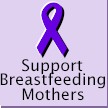[Who] [What] [When] [Where] [Why]
When will breastfeeding become the norm again?Formula feeding was introduced as Western Europe and the United States were becoming urbanized and industrialized. Formula feeding is a form of social engineering. Feeding on a timed schedule was seen as a way to inculcate regular habits in infants so that they would become good workers in industrialized societies. Along with the change to formula-feeding, parents were urged to tend to infants on a rigid schedule and not to hold, hug and kiss their babies. Now we know that artificial formulas provide inferior nutrition. We also know that, in order to thrive, babies of all mammalian species need close physical contact that breast feeding provides. It is only natural to ask, "Why don't more women breast feed their babies?" There are several reasons.
EducationPerhaps women who are less educated are less likely to understand scientific studies. Sometimes research that is reported on television and in newspapers is confusing and contradictory. Research results are often reported in the media without providing a context of related research that supports or contradicts a new finding. But study after study has shown that breast feeding is superior to formula feeding in many ways. If prospective mothers could be presented with research findings in a coherent manner, perhaps more would choose to breast feed.
EconomicsAs a nation, the U.S. could save millions of dollars in health care and other expenses if more families were educated about breast feeding. The United States Department of Agriculture operates the Women, Infants, and Children (WIC) food commodity program which provides free food and formula for lower-income families with infants. The WIC program spends millions of dollars on formula so that babies can be fed formula. But the WIC program acknowledges that breast feeding is superior to formula! Why? That brings up...
Social IssuesBecause some people simply can't separate sexual feelings from womens' breasts, we rarely see mothers breast feeding in public. Women are reluctant to breast feed. They don't want to be stared at, or have to listen to rude comments. We can only hope that as more women breast feed their children it will become socially acceptable feed infants wherever and whenever they are hungry. Many women refuse to even try breast feeding even though they are well aware that breast feeding is the preferred way to feed babies. What is stopping them? One important factor is that educational materials about feeding babies often treat the alternatives of formula or breast-feeding as nearly equivalent alternatives. The formula companies and health care institutions who produce some of the educational materials available want women to feel OK about whatever decision they make. But what if women make a poor decision for the wrong reasons? If every woman is educated about breast feeding then we--and she-- should accept whatever decision they make. But if women choose not to breast feed because they aren't educated, or if they are misinformed, or if they choose not to breast feed for cosmetic or other selfish reasons, then they shouldn't feel good about their decision! |

Visitors since July 19, 1998